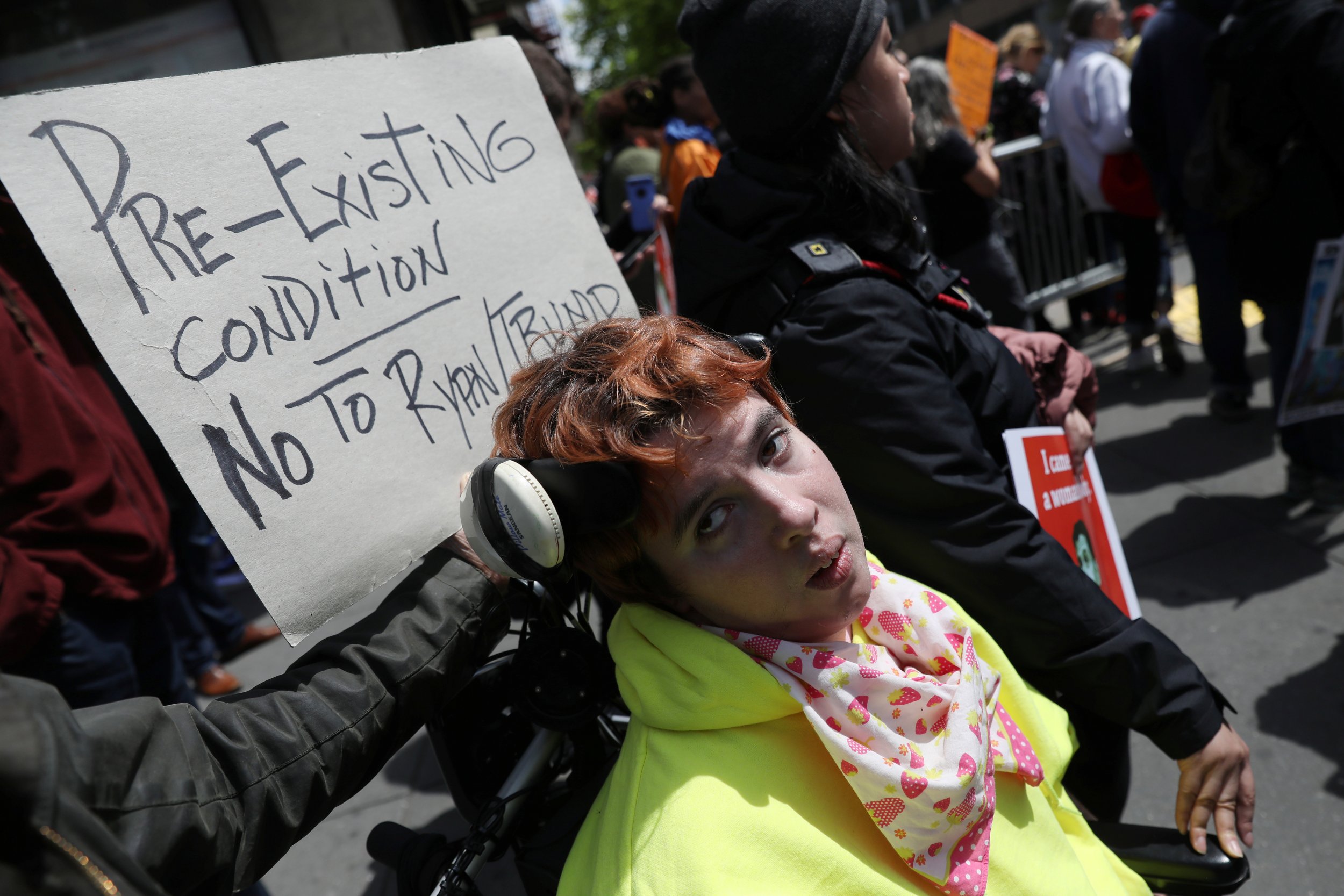
The Republican healthcare bill the House passed in early May would leave 23 million people uninsured by 2026, the Congressional Budget Office (CBO) estimated Wednesday afternoon. That's a slight improvement over an earlier version of the legislation that the nonpartisan agency assessed in March. But the CBO, which is responsible for analyzing the impact of proposed legislation for Congress, also warned in its latest report that if states decided to use the waivers included in the current version of the bill to avoid Obamacare regulations, it could make healthcare unaffordable for their residents with pre-existing conditions. And that's a huge political problem for Republicans.
Related: The Agency That Could Derail Republicans' Obamacare Repeal
The CBO's verdict contradicts claims by House Speaker Paul Ryan and other Republicans that their latest Obamacare repeal proposal would not leave the most sick and vulnerable Americans high and dry. Ryan and other supporters of the bill argued that people with pre-existing conditions seeking insurance in the individual market, rather than through their employers, would be adequately covered by so-called "high-risk pools," subsidized by funding included in the House bill. But this new analysis will confirm fears that such high-risk pools are inadequate. And, if signed into law, it would undermine a promise made by President Trump and Republicans that they will continue protections for those with pre-existing conditions established under Obamacare.
The waivers the CBO warns about were added to the House legislation as part of a compromise to win conservative support, after Republican leaders failed to reach a deal on an earlier draft. Ultimately, their inclusion helped Republican leaders win enough support to narrowly pass the bill. The new CBO report, however, makes it even more unlikely Senate Republicans will include such provisions in the version of the Obamacare they are currently trying to hash out.
One of the waivers in the House bill would allow states to avoid federal requirements, enacted under the 2010 healthcare law, that insurers in the individual market cover 10 so-called "essential health benefits" like maternity care and hospital stays. The second would allow states to lift a cap on how much insurers in the individual market can charge people with pre-existing conditions. The CBO predicts that states that activate the second waiver would see premiums for those less-healthy or "high risk" people "rise over time." And ultimately, those people will "be unable to purchase comprehensive nongroup health insurance at premiums comparable to those under current law, if they could purchase it at all—despite the additional funding that would be available" in the law to offset those costs.
Healthy people in the individual market, meanwhile, would see their insurance premiums fall. That would draw more people into those markets, keeping them stable in many part of the country, the CBO forecasts. But the report also predicts that out-of-pocket costs would rise, particularly in states that waive the "essential health benefits" requirements. Overall, the agency estimates the House bill would lead to $119 billion in reductions to the federal deficit over the next 10 years, compared with existing forecasts under Obamacare. That's $32 billion less in savings than the initial version of the House bill it analyzed.
In its evaluation of an earlier version of the House healthcare proposal, released in March, the CBO estimated it would leave 24 million more Americans uninsured by 2026. Millions of those people would lose insurance thanks to nearly $900 billion in cuts to Medicaid funding, reducing the scope of the government-funded insurance program for the poor, elderly and disabled. Those Medicaid cuts remain in the version of the bill the House passed. That, too, is a sticking point for many Republicans in the Senate, particularly those representing states that chose to expand their Medicaid programs under Obamacare.
Another mark against the House bill senators are likely to factor into their considerations: it remains broadly unpopular among Americans. A new Monmouth University poll released Wednesday found just 32 percent approve of the latest version of the AHCA, while 55 percent disapprove. That includes 56 percent of independents and 84 percent of Democrats. Seventy-one percent of Republicans, meanwhile, approve of the House-passed bill. It's hard to see how the latest CBO evaluation would dramatically improve those figures.
Uncommon Knowledge
Newsweek is committed to challenging conventional wisdom and finding connections in the search for common ground.
Newsweek is committed to challenging conventional wisdom and finding connections in the search for common ground.
About the writer
Emily spearheads Newsweek's day-to-day coverage of politics from Washington, D.C. She has been covering U.S. politics, Congress and foreign affairs ... Read more
To read how Newsweek uses AI as a newsroom tool, Click here.








